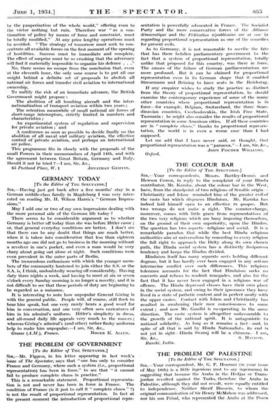THE PROBLEM OF GOVERNMENT
[To the Editor of THE SPECTATOR.] SIR,—Mr. Figgess, in his letter appearing in last week's issue of The Spectator, says that "one has only to consider France and Germany, where- such a system (i.e., proportional representation) has been in force," to see that " it cannot fail to produce complete chaos in practice."
This is a remarkable statement. Proportional representa- tion is not and never has been in force in France. The condition of France (is it just to call it " complete chaos " ?) is not the result of proportional representation. In fact at the present -moment the introduction• of proportional repre- sentation is powerfully advocated in France. The Socialist. Party and the more conservative forces of the Alliance democratiqtte and the Federation republicaine are at one in regarding proportional representation as one of the remedies for present evils.
As to Germany, it is not reasonable to ascribe the fate that has there befallen parliamentary government to the fact that a system of proportional representation, totally unlike that proposed for this country, was there in force. The causes of the failure of German parliamentarisin are more profound. But it can be claimed for proportional representation even in its German shape that it enabled Stresemann and Briining to have seats in the Reichstag.
If any enquirer wishes to study the practice as distinct from the theory of proportional representation, he should examine the contemporary experience of some of the many other countries where proportional representation is in force—for example, Belgium, Switzerland, the three Scan- dinavian countries, Czechoslovakia, the Irish Free State, Tasmania ; he might also consider the results of proportional representation in some American cities. If all these countries are in " complete chaos," thanks to proportional represen- tation, the world is in even a worse case than I had supposed.
Let me add that I have never said, or thought, that
proportional representation was a " panaces."—I am, Sir, &c., Oxford.
JOHN FISCHER WILLIAMS.




































 Previous page
Previous page